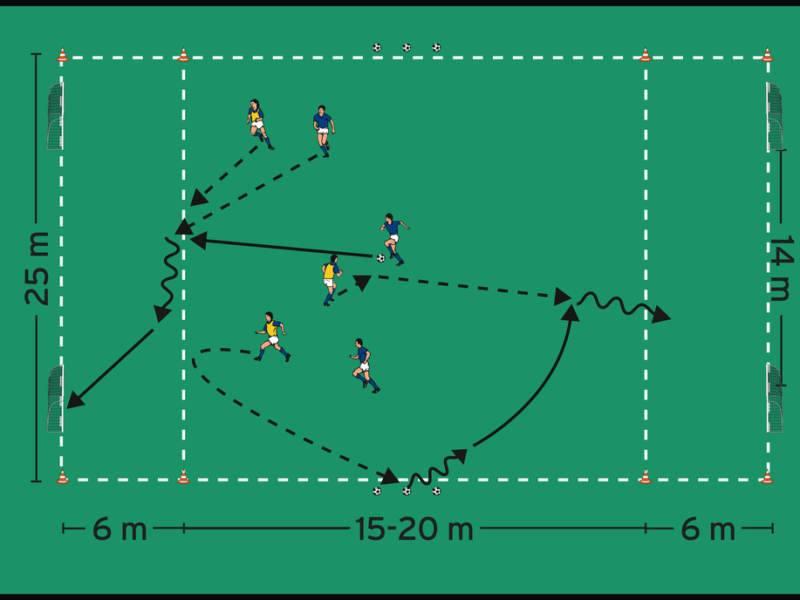As a parent, it is normal to be concerned about your child’s experience in sports. And a common question many parents ask themselves is, “Is my child too small to play soccer?”
Let me ease your mind right away — no, your child is not too small for soccer. Actually, size isn’t that important, especially in this sport.
Whether your child is a small tot or an older teenager, it’s only natural to feel concerned about them holding their own against bigger, taller kids. But here’s the good news: soccer is a sport that welcomes all shapes and sizes.
Let’s look at why height and size should not hold your child back from enjoying soccer, what the plus sides of being smaller are for players, and how you can support them through the ups and downs of their growth journey.
Youth Soccer Should Be Fun (Not About Size)

Before we get too technical, there’s some setting of expectation necessary regarding what we hope to achieve. The child is supposed to have fun, develop their skills, and build their love for the game while playing soccer at tender ages.
Being realistic, only 1% of the players in college end up pro; that is, great ambition is OK, but the greatest focus of the youngsters should be on enjoyment, teamwork, and learning.
It is a sport that every child, irrespective of size, shape, or athletic ability can play a role in. From club soccer to recreational leagues, from pick-up league teams to playing for fun in the backyard, there is always a place for your child.
And if soccer is not a passion for them, then there is always a host of other sports for them to get into: basketball, tennis, volleyball.
What matters most is not to burden them with the expectation being set due to their stature. Unlike other sports, soccer doesn’t demand towering height or extreme muscular strength.
The skills, intelligence, and passion might just be as crucial, if not more so.
Why Size Doesn’t Matter Much in Soccer

Size is not a big deal in soccer compared to skill, technique, and game sense.
I know with other sports-like basketball or American football, the size can be an obvious player advantage, but with soccer, it’s different. While height might be helpful in certain positions, such as that of a goalkeeper, it doesn’t necessarily factor into a player’s potential success on the field.
Take for example Lionel Messi: Messi is 5’7″ and weighs a paltry 148 pounds, hardly an imposing figure. Yet he is considered by many to be the best soccer players ever to have played the game.
His size never held him back, Messi’s strengths-balances, dribbling ability, vision, and creativity-make him a football legend.
The other 5’7″, 150-pound player was Xavi Hernandez, who took over by using his intelligence and technical mastery of the game. Even at midfield positions where much physical strength was required, his height did not make him look vulnerable. He reached his renowned fame with his incredible passing precision and his capability to control the tempo of the game.
That is the magic of soccer: regardless of whether you are tall or short, muscular or lean, there’s always a way to shine if you focus on the right things.
CHECK OUT | 7 Effective Ways for Your Child to Earn More Playing Time in Soccer
The Real Ingredients to Soccer Success
The truth is that the success of any soccer player depends upon certain aspects: skill, strategy, and passion. And the good news? All of these are independent of height.
1. Skill Development
It’s more important than size is your child’s technical ability.
Can they control the ball well? Do they have quick feet? Can they make smart passes and read the game? These abilities come with practice, and they are available to players of all sizes.
Whether or not your child is the smallest on the team, they still can excel by being more technically proficient.
2. Tactical Awareness
Soccer has often been termed as a thinking person’s game. Knowing where to be on the field, how to move without the ball, and what will be the anticipation of the play can be an added advantage to any player.
Many of the best players are not the biggest, but they are often the smartest. Your child will learn to outthink their opponents, which is a game-changer.
3. Heart and Passion
The final and most important factor is one that cannot be taught: heart.
Kids who love playing soccer often compete at levels far beyond what their physical limitations may indicate they could. If a child loves the game and wants to get better, he sometimes can overcome barriers with regard to being smaller or slower.
Soccer is full of stories about players who made it through the sport by sheer cut of hard work and a lingering love affair with it, never mind their body type.
CHECK OUT | Can I Play Soccer With a Sprained Ankle?
Teenage Years: Growth and Struggles
With age one’s relationship to the body does change. There are concerns about a child being too small during the teen years. And size does become more of a factor then, though it is also a time of gross growth and development for nearly anyone.
Most girls enter puberty at about age 8; boys start a year or so later. Puberty can take as long as five years, which is to say that some kids start growth spurts early, while others take a little longer to catch up.
Throughout middle school and the early high school years, your child may struggle if they fall on the more petite end, since they may find themselves competing against peers who have already entered into growth spurts.
Keep in mind that soccer is an equalizer. Usually, around age 14 or 15, kids all balance out in size, and the one who works on their skills during that period usually becomes the best player.
What this really means is that soon, the years when your child is at such a height disadvantage with other kids his age will quickly pass, and what will matter most will be how much he has worked to improve his game.
Embrace the Advantages of Being a Smaller Player
Smaller players do enjoy certain advantages when it comes to soccer. Many times, smaller players are quicker and have a lower center of gravity, thus allowing them to change direction with ease and maintain better balance during the play.
This quickness lets them easily bob in and out of defenders, thus making them tough to stop. In addition, speed and decision-making are usually instinctive for small players only because of the capability to break through crowded areas and fast responses to what happens around them in the game.
There will be bigger kids who could well push your child around on the field, but soccer is not a sport of brute strength. It’s played with the feet, the brain, and heart.
The biggest players are not always the best, and many smaller players can outplay larger ones by being quicker, more technical, and simply smarter on the ball.
One of the most common mistakes parents make is waiting until their child is big enough to play soccer. But your child is already big enough. Soccer does not need any specific body type or height to start with, and waiting for your child to grow bigger may impede progress in developing much-needed skills.
The more the time a child gets, starting early, the better development of technical and game sense possible in the child.
Instead of focusing on size, encourage your child to work at their soccer skills: practicing dribbling, passing, shooting, and building up their speed and agility. Not only will this make them a more well-rounded player, but it will help them build confidence on the field regardless of their size.
CHECK OUT | 7 Best Ways to Keep Your Soccer Kids Healthy
Focus on Enjoyment, Not Pressure
At the end of the day, soccer is supposed to be fun. Yes, competition is part of the game, but for young players, it is about enjoying the experience. Putting size-based pressure on your child, or worrying too much about growth often takes away from the joy they can have when playing.
Encourage the child to play with passion, develop skills, and have faith in the process. Like any other sport, soccer has its ups and downs; those who fight out stay in it and work hard emerge stronger, fitter, and mentally strong.
Recap
So, is your kid too small to play soccer? Absolutely not.
Soccer is a sport that can be played by kids of any size. The bigger ones may have some physical advantages, but they are often equaled out by the smaller kids in their speed, agility, and technique.
The most critical factor in soccer is for your child to love the game, work at their skills, and remain passionate about the game.



